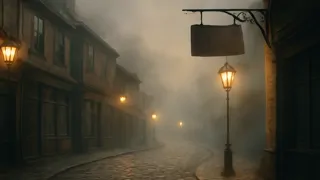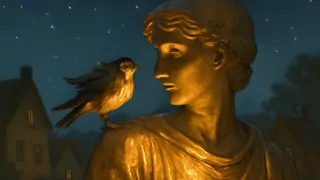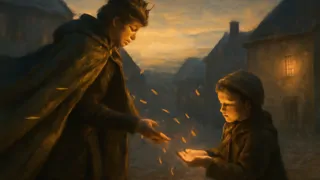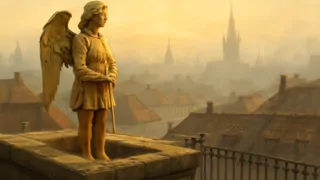Introduction
In the pale light of a mist-draped dawn over 19th-century Dublin, every cobblestone shimmered with the lingering breath of night’s chill. Along the old city walls, a statue rose above tiled rooftops and iron balconies: the Happy Prince, immortalized in burnished gold leaf and crowned with rubies soft as heartbeats. For countless evenings he had gazed across bustling streets and narrow alleys, his stony eyes reflecting lantern glows and whispered prayers. Below him, the ragged edges of poverty threaded through families huddled by hearth fires, orphans cradling tattered dolls, and weary dockworkers retreating from the rain. No soul knew why the prince’s lips bore a gentle smile or how deep compassion had found form in metal. On the first frost of winter, a tiny swallow, slowed by currents of wind and longing for the southern warmth, alighted upon the statue’s shoulder. His feathers trembled like stray sparks in the dawn air. Neither prince nor bird spoke a single word, yet in that silent meeting under an arched gateway, a bond took root. Unseen by the city’s inhabitants, they would forge an alliance far greater than gold, kindling hope in the hearts of Dublin’s least seen and most forgotten. Each evening, the golden surface patrolled by fading light invited hidden wonders into plain sight—children pressing palms to cold iron gates and dreamers pausing to admire the rosy hue on the prince’s cheeks when the sun sank low. It was said that sailors returning at dusk bowed their heads at the bridge, hoping for safe passage, and travelers paused to leave single coins at the statue’s base. Yet as winter deepened, few took note of the silent tears that formed at the edge of the prince’s ruby eyes. When the migrant swallow, carrying memories of distant orange sunsets and palm-studded shores, found his way to this solemn guardian, neither understood the journey that lay ahead: a pathway traced in falling gold leaf and fluttering wings, leading to revelations of love that transcended form. In the hush before dawn, the city still held its breath.
A Statue’s Vigil Over Dublin
From his lofty perch atop the ancient city wall, the Happy Prince looked down upon the winding streets of Dublin. Under a pale winter sky, his gilded form gleamed with an inner light that belied the cold stone at his core. Crafted by a master sculptor whose fingers had danced across malleable bronze, each fold of the prince’s cloak shimmered like rippling water touched by fire. Below, the river Liffey ran silent through iron bridges, its grey surface reflecting the ghostly outline of warehouses and lamplight. Alleyways curled like ribbons between sooty storefronts, and every carved archway seemed to whisper secrets from generations of settlers and dreamers. With every passing dusk, lantern brims were filled, and flames chased away the creeping fog that pooled beneath narrow doorways. Yet beyond the circle of lamp glow lay iron fences, rickety doors, and forlorn windows where no ember dared to shine. Though no human voice could reach the prince’s ears, he perceived the soft echo of shuffles, the hush of whispered prayers, and the distant sigh of a tired mother. In the hush of first light, he sensed a world in need of warmth and mercy. He imagined the heartbeat of the city—each thump of boots on cobbles, each murmur of trade carried by the wind. He felt the trembling of a child starving in a corner parish, though his own heart was encased in gilded bronze.

In the hush of the late evening, when shop shutters clanged and tavern revelers spilled onto damp streets, a single tear would trickle from the prince’s ruby eye. As a silken ribbon, this tear caught the light and cast a faint rainbow upon crumbling brick. No onlooker ever noticed this gentle weeping—no guard nor traveler paused to peer skyward—yet the prince’s sorrow was as real as any mortal grief. He mourned the invisible wounds of his city: the child too weak to rise at dawn, the laborer whose hands were scarred with toil, and the solitary widow whose prayers went unanswered. Each of these silent cries resonated within the hollow of his breastplate, filling him with an urgent desire to comfort and console. But wearing a crown of cold metal and standing upon an unscalable column, he felt trapped between empathy and impotence. He longed to breathe warmth into frozen hearths and to feed the empty hands that cupped the wind. In that still night, the prince contemplated the one truth he knew: true compassion required action beyond silent tears. He wished for a messenger whose wings could carry gold to those who needed it most. If only a faithful friend might bear his gift unseen.
At the base of the statue, a sprawling square bristled with makeshift stalls and shivering figures in threadbare coats. Fishermen, recently returned from storm-lashed sea voyages, leaned against wooden crates while sharing fish heads with stray dogs. Near the market’s edge, a rag-and-bone man sorted battered pots, each clanching metal piece a token of a hard year’s survival. An elderly piper, his breath ragged with cold, played a mournful refrain that drifted over cobbles and lingered like a whispered prayer. Young mothers clasped limp infants to their chests, hoping that a stray loaf of bread would drift within reach. Later, shopkeepers barred windows and locked iron gates, leaving only lampposts to watch over silent doorsteps. In this theater of shadow and light, the tapestry of need was woven into every doorstep and draped across every chimney stack. The moon, a pale sentinel, cast long silhouettes, but still no hand offered warm cloth to proud coats or fresh soup to aching bellies. While the prince observed, the city’s breath seemed to falter, caught in the grip of frost and despair. But even in the hush of winter’s cruelest hour, glimpses of hope flickered: a smuggled scarf left at a door, a hidden coin tucked beneath a ledge, and a prayer that rose above the hush of cold stone.
Though his feet were bound to unyielding metal and his voice locked silent in stone, the Happy Prince’s heart pulsed with a longing to serve. He studied the shifting crowds and felt each pang of hunger, each flicker of desperation, as though they were his own. The works of artisans who had gilded his surface and inlaid his eyes with rubies had brought him honor, yet he knew that gilded splendor counted for little in the face of human suffering. Beneath his golden cloak, he felt a warmth that no forge could ignite—a warmth born from empathy and the unspoken promise to help. At night, when echoes of church bells faded and the city’s pulse slowed, he closed his stony eyelids against the harsh glare of distant lanterns, imagining how he might send gifts to the poor without exposing their shame. If only he could call upon a creature of wing and feather to scatter his riches where they were needed most. In the depths of his silent vigil, a plan took shape, poised to bridge the gulf between silent longing and selfless action. It would require courage from both heart and wing, but the Happy Prince was ready to embrace sacrifice in the name of compassion. He awaited the arrival of a companion who could carry hope on the breeze.
An Unexpected Visitor
Late one frosty evening, when stars pricked the navy sky, a solitary swallow fought against a biting north wind as he followed the river’s silent path toward warmer climes. His wings ached from days of ceaseless flight, and each downstroke felt like the weight of a year of longing. Below him, distant hearths flickered in slumber, and the muffled creak of carriage wheels sounded like a lullaby. Nearly spent, the bird sought refuge; his tiny heart pounded like a trapped drum in his ribcage. As he descended toward a slender ledge on the city wall, the gleam of gold caught his eye—an otherworldly shimmer that promised sanctuary. In that gilded glow, exhaustion gave way to wonder, and tired wings carried him to rest upon the prince’s cold shoulder. The statue towered above him, silent yet tender, its ruby eye glinting like a distant promise of kindness. He tilted his head, puzzled by the prince’s gentle smile. A cool breath of marble drifted into his feathers, and for the first time in days, fear evaporated. The lamplight danced across the folds of the statue’s garment, casting patterns that soothed his weary spirit. In the hush of midnight, the swallow felt a curious stir deep within.

As the moon arced across the sky, the swallow nestled into a warm crevice in the prince’s cloak. Below, the world lay still; chimney smoke curled lazily into the air, and distant church bells tolled midnight. The sharp bite of frost seeped into his bones, yet here, atop this gilded sentinel, he felt sheltered. Memories of his homeland in distant marshes drifted through his mind—fields of golden reeds and the soft lull of summer breezes. Though the cold had slowed his flight south, the thought of deserting his journey tugged at his conscience. Yet with every heartbeat, he sensed the statue’s silent invitation, an unspoken plea for companionship. He glanced back toward the horizon, where the faint flare of dawn had yet to appear, and chose to linger. For in that moment, the swallow understood that some paths demanded delay for a greater cause. He coiled his wings around himself, finding unexpected comfort in the metallic warmth beneath. Below, the village seemed to breathe with hope, and the swallow decided to stay until morning’s first light.
When the first tendrils of sun brushed the rooftops, the swallow awoke to find the prince gazing tenderly at him, his ruby eyes reflecting the soft glow. The bird blinked against the warmth, startled by this living sorrow etched in gold. Without a word, the statue inclined his head, inviting the swallow closer to his inlaid foot. In that silent gesture, the prince conveyed a secret: an earnest desire to do more than watch the suffering below. The swallow felt a surge of purpose rise through his chest, mingled with uncertainty. "Great Prince," he would have whispered if words could pass stone, "I am but a single bird with fragile wings." Yet as he peered at the statue’s serene expression, he sensed a gleam of resolve. Here was a friend who longed to give, if only he had a messenger brave enough to deliver his gift. The swallow gathered his courage and fluffed his feathers against the chill. He hopped along the golden surface, feeling the weight of destiny settle upon his shoulders.
Through that crisp dawn, the prince spoke in thoughts the swallow somehow understood, describing families who shivered in crumbling cottages, children with hollow eyes, and widows who cried themselves to sleep on bare floors. Each description felt like a brushstroke of sorrow across the sky, begging for relief. The swallow listened, his heart swelling with compassion, but doubt flickered in his mind. A far-off lover waited in warmer lands, and every moment he lingered here risked the promise of reunion. Yet the prince’s anguish, as vivid as the rising sun, eclipsed his own longing. He closed his feathers against a sudden gust and resolved to help. "Let me carry your gold to those who need it most," he would say, if words could bridge their worlds. And in that pact between bird and statue, the first gifts of mercy were set to depart in flight.
Gently, the swallow plucked a curling strip of gold from the prince’s cloak and, with wings flashing like embers in the sun, he darted toward a modest tenement whose windows were dark. He slipped through a narrow opening, past startled rodents and half-empty tins, and placed the shimmering treasure in the small outstretched hands of a trembling child. The infant’s eyes widened with wonder as the cold metal warmed her fingers, and somewhere beyond, a mother sighed in disbelief. Before any alarm could sound, the swallow fluttered back to the wall, where the prince awaited with a tender glow. Word of a mysterious benefactor zigzagged through the city’s poorest neighborhoods, like a hymn whispered under lantern light. And so began the delicate dance of generosity between feather and gold, of hope born on the wings of a brave companion. And each time the goddess of dawn painted the sky in pastel hues, they repeated the ritual—one leaf carried, one heart warmed. Even the prince, bound in gilded silence, felt an unspoken joy bloom in his chest.
Gifts of Gold and Feathers
As winter deepened, the Happy Prince’s cloak grew patchy where the swallow had plucked the final thinnest curls of gold, yet his spirit shone more brilliantly than any gem. Each morning, the swallow would alight upon the prince’s shoulder, ready to bear a gift of precious metal to the city’s most desolate corners. No jewel was too small, no plea too humble; every golden leaf carried the warmth of compassion into freezing homes. One crisp dawn, the bird spiraled through an icy breeze to deliver a slender ribbon of metal to a violinist whose strings had long lain silent. In a humble attic, the musician cradled the leaf, and soon his bow coaxed a trembling melody that awakened hope in nearby streets. Day by day, their generosity kindled a quiet revolution of goodwill. Even the proudest families, once blind to the beggar’s need, felt their hearts soften under the shimmer of a single golden gift. And though the statue’s surface began to bear bare patches of grey, passersby marveled at his unwavering generosity. The swallow, sensing the prince’s unspoken pride, fluttered back each time with his own vow etched into feather and bone. He felt each flutter as a solemn promise, and the prince, in turn, felt that promise bloom within his gilded breast.

Word of the statue’s fading splendor drifted through Dublin’s drawing rooms and merchant halls. Rumors swirled that a loyal servant of the prince had stolen the precious metal, while others whispered of a secret uprising aiming to reclaim the gold for the poor. Councillors debated in candlelit chambers, clutching ledgers that counted every ounce of weight lost from the statue’s cloak. Yet no one suspected the bond between stone and sky—a silent partnership that surpassed any earthly decree. At night, lantern light danced along torn patches of metal, and curious onlookers wondered if the prince wept for the loss of his riches. Merchants grumbled of lost value, but never guessed that each fall of gold leaf carried solace to ragged hands in the poorest alleys. Meanwhile, the swallow wore a steady path between palace columns and humble thresholds without pause. He skimmed over rooftops like a living ember, trusting the prince’s unwavering faith. Their shared purpose shone brighter than any blade of gold lost to the cold horizon.
In the northwest corner of the city, a widowed seamstress, whose needle had grown crooked with worry, found a glimmering fragment of gold in her battered bonnet. She used it to mend fraying cloth, weaving warmth into the coats of orphaned children. Nearby, a retired sailor hunted for stray driftwood to warm his hearth, but instead discovered a slender necklace of gold leaf, which he fashioned into pendants for his grieving daughter. At dawn, they adorned daisies and ribbons upon the statue’s base, in silent thanks to the unseen benefactor. In a narrow lane, a poor scholar spilled tears over tattered pages until he found a strip of fine metal wedged in a cracked mortar joint. He sold it to acquire new parchment and penned letters that spread stories of hope throughout the countryside. And so, as Dublin slept, the swallow wove between miracles of mercy, each flight a testament to the prince’s earnest heart. Each morning, whispers of newfound blessings rippled through the city’s veins like a comforting lullaby. The act of kindness, invisible to most, became the quiet pulse of an awakening community.
But winter’s icy grip began to steal heat from the swallow’s fragile form. His tiny chest trembled under the weight of frost, and each flight grew more labored than the last. He perched upon the prince’s leaden wrist, feathers damp with crystalline dew, and lit his final ember of courage. The prince, his golden countenance now patched with silver-gray bronze, felt the weight of sorrow settle like snow upon his shoulders. With trembling wings, the bird offered his greatest sacrifice—a farewell peck upon the prince’s cold cheek, soft as a whispered prayer. The prince bowed his head, shedding silent tears that glistened like dewdrops in the pale sunlight. He murmured a silent benediction: "Go forth, faithful friend, to the realm where wounds find wings to heal." And as the swallow drew one last breath of winter air, his spirit soared beyond the iron gates, leaving an echo of loyalty forever entwined with the prince’s soul. The hush that followed was more profound than the deepest trance of midnight. Every corner of Dublin seemed to pause, as though honoring the devotion that had flown beneath the stars. In that moment, compassion became more than a gesture—it became an immortal testament.
On the morning of the spring equinox, the townspeople found the statue and its friend in solemn repose. The swallow’s tiny body lay curled upon the prince’s foot, his feathers pale as hope dimmed. The Happy Prince, bereft of his golden finery and his dear companion, felt a hollow ache echo through his gilded ribs. Mourners gathered, their breaths forming mist that hovered between sorrow and gratitude. A humble carpenter approached the statue’s column and carved a simple inscription: "Here stood a prince whose compassion knew no bounds and a swallow whose loyalty warmed frozen hearts." Over time, artisans from distant lands brought new metals and precious stones, but none could replicate the warmth of that original gift. And always, on chilly nights when the wind whispered through the lamp-lit streets, villagers spoke of a golden prince and his little friend, reminding one another that sacrifice, however small, could transform the harshest winters of the soul. In the soft glow of longing eyes, their story danced between flame and shadow, a tender refrain of hope. And so, the legacy of gold and feathers endured, echoing in every act of kindness that followed.
Conclusion
When the coldest season yielded to the tender promise of spring, Dublin discovered that true warmth could not be forged in a blacksmith’s fire nor counted by any treasury. Generations have passed, yet the city still carries the echoes of that winter of miracles, and the tale of stone and feather remains as alive as the morning breeze. It was found in the silent meetings between a gilded statue and a humble swallow, in the hush of midnight gift-giving, and in the bright smile of a child cradling a single strip of gold. Though the prince’s outward glory had faded, his spirit shone with an eternal radiance, revealing that compassion thrived not in opulence but in the courage to share what one held most dear. The swallow’s final flight, though bittersweet, became the bridge connecting stone to soul, proving that love knows no boundaries of form. May their story beckon us to reach beyond our comforts, to listen for the soft plea of those who dwell in shadowed corners, and to remember that even the smallest act can kindle an enduring flame. Today, when dawn light paints the city in gentle hues, you may still glimpse the echo of their sacrifice in every generous act, in every whispered prayer for another’s well-being. Their legacy lives on in the seeds of kindness sown by each tender gesture, reminding us that the greatest gift we can offer one another is the warmth of a selfless heart. In the art of giving, we discover the truest shape of humanity.


















